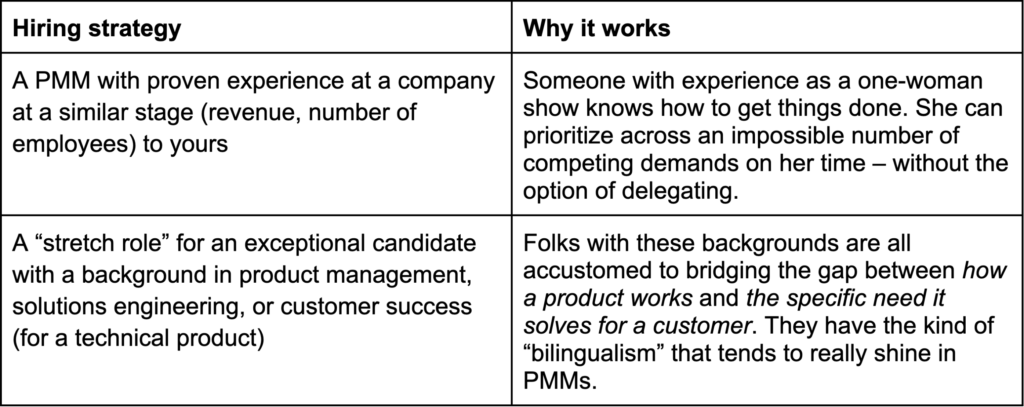You’re a B2B tech CEO fresh out of your quarterly board meeting. Your company posted great growth numbers this quarter, but a new competitor just entered your category – and is starting to create buzz.
Your board’s recommendation? Hire a product marketer to help you “clarify your story” and “own your category.”
Sound familiar?
Yes, but…uh what does product marketing do, exactly?
Product marketing — or “PMM” as it’s often called, to distinguish from Product Management/PM — is responsible for your message and how it resonates with customers and prospects.
This means that product marketing needs to be your company’s leading authority on the following:
- Customers: who are your buyers/users (personas)? How are they similar/different to each other (segmentation)? What keeps them up at night (pain points)? How do they research, evaluate, and buy software (buyer’s journey)?
- Market: How do customers, prospects, analysts, and investors think about what you do (category)? What alternatives exist (competition)?
- Technology: What problems do you solve (value proposition)? How are you different from others (differentiation)?
As Steve Vranakis of Google Creative puts it: “Know the user. Know the magic. Connect the two.”
If you’ve never managed a PMM before, you’ll find that they tend to spend their time in a few areas:
How an early-stage B2B product marketer spends her time

Product marketers are 🦄s
Product marketing occupies a special, mystical place in the mind of early-stage companies. Boards and CEOs tend to view the function as a rare, magical skill set.
Case in point: PMMs command higher salaries than their peers in other marketing disciplines. (See the jaw-dropping 50% premium at the director level between product marketing and demand generation.)
The problem? Not only is finding great PMMs hard (in my experience, often harder than finding great VPs of Marketing or CMOs)…product marketing doesn’t come with a user’s manual. And even great leadership teams often don’t know how to harness the power of this magical discipline.
So here are a few “inside baseball” tips – from a career product marketer – for hiring your first product marketer. These tips will help you set expectations, target the right candidate profile, and evaluate candidates in a smart way.
Tip #1: Go in with the right expectations.
The cavalry isn’t coming.
A great product marketer will be an accelerant for achieving product-market fit – but is almost never a silver bullet.
A good PMM will ask smart questions, challenge assumptions, and bring new insights to the table. But getting the flywheel turning requires buy-in and execution at every level of the org: sales, product, engineering, and customer success.
So if you have a team that doesn’t want to change the way they think and do business – save yourself the trouble, and don’t bother hiring a PMM at all.
One of our clients was facing all the signs of not yet having reached product-market fit: high customer acquisition cost (CAC), low conversion on sales deals, customer churn. The product was a hammer in search of a nail.
They hired a world-class product marketer – a top 1% professional – to help turn things around. The PMM realized they were targeting the wrong persona and use case, and tried to convince the exec team to pivot. But his leadership peers were convinced that he just needed to do a better job “educating the market.”
Ultimately, he quit…and the company had a disappointing exit after their growth challenges persisted.
The lesson? If your company is a clam, product marketing is the grain of sand (persistent, sometimes annoying, catalytic) that can help you ultimately end up with a pearl. But no single person or function, no matter how brilliant, can deliver product-market fit alone.
Going into the PMM hiring process with expectations like “landing our positioning” or “creating our category” is a recipe for disappointment (h/t Dave Kellogg for why the last idea is misguided).
Tip #2: Don’t hire the candidate your board loves.
If you’re a scaleup, you may have the luxury of building out an entire product marketing team: a launch specialist, a competitive intelligence expert, an ecosystem guru, a pricing maven, etc.
But if you’re a startup, you need someone who’s not just a thinker – but a doer. Someone who can roll their sleeves up and help with actual tasks: building the first meeting deck for sales, writing the blog post about the new product launch, designing an ROI calculator for your website.
My recommendation is to go with one of the two following hiring strategies:

As for domain expertise: use it as a deciding factor if you’re really on the fence between two candidates, but otherwise it doesn’t matter. For real. Any PMM worth their salt should be able to quickly (i.e., within 3 months) learn a new domain, no matter how technical – cybersecurity, machine learning, nanobotic telemetry (okay fine, we made the last one up, but you get the idea).
Finally, be wary of the following candidate profiles that almost never work out:
The first is BigCo PMMs. These are candidates that your board *loves* (because of their tours of duty at IBM and Microsoft). These folks are often brilliant, but may be accustomed to having huge, scaled teams responsible for actually doing day-to-day PMM work. Worst case scenario?
Hire one of these folks, and you’ll end up six months from now with a bunch of decks on buyer journeys gathering dust on the shelf.
The second gotcha profile is a marketing “crossover” – someone from another marketing discipline (e.g, ops, comms, content, demand gen) looking for a launchpad into PMM. In my experience, these hires never work out because…well, PMMs are their own weird breed.
Tip #3: Flip the interview on its head.
A lot of PMM interview questions tend to focus on either:
- Previous product marketing experience (e.g., tell me about your last product launch) or
- Scenario-based questions (e.g., how would you launch the following product?)
Neither of these questions is great.
Questions focused on previous PMM experience may be mildly illuminating if you really dig for the thought process and their unique contributions. But more than perhaps any other function, PMM is a team sport. You’re working hand-in-hand with sales, CS, and demand gen. More often than not, these questions result in fuzzy answers about team activities that reflect relatively little individual leadership.
For a scenario-based question, any PMM candidate who has been through Pragmatic Institute training can rattle off a 65-step launch checklist – and tailor it to a different kind of launch (e.g,. a tier 1, tier 2, or tier 3). Being able to do it theoretically is very different from being able to lead and resolve nuanced disagreements about messaging or channel strategy.
What I prefer instead:
- Behavioral questions focused on influence. Influence across functions – often without authority – is one of the core superpowers of great PMMs. Questions that work well: “Tell me about a time you changed someone’s mind.” Or “tell me about a time you disagreed with the CEO about something big.”
- A deep walkthrough of the homepage of a website they built. This gives you a blueprint of how they think. How do they describe their thought process? Do they gravitate towards fuzzy analyst-speak (“we wanted to stake out a claim to the emerging space of nanobotic telematics”) or do they lead with understanding and empathy of their customer and pain points?
- Ask them to describe neural networks to a five year-old. Or…whatever. Something technical they’ve worked on. Again, this gets to a core skillset around bilingualism that’s at the heart of PMM – being able to grasp the magic of something complex (like machine learning), but tailor the message to the needs of someone who may see their problems very differently.
The bottom line
Hiring your first product marketer will be difficult. But it doesn’t have to be a crapshoot.
Go in with the right expectations, target the right candidate profile, and equip yourself to evaluate candidates in the right way – and you’ll be well on your way to capturing the PMM magic.








